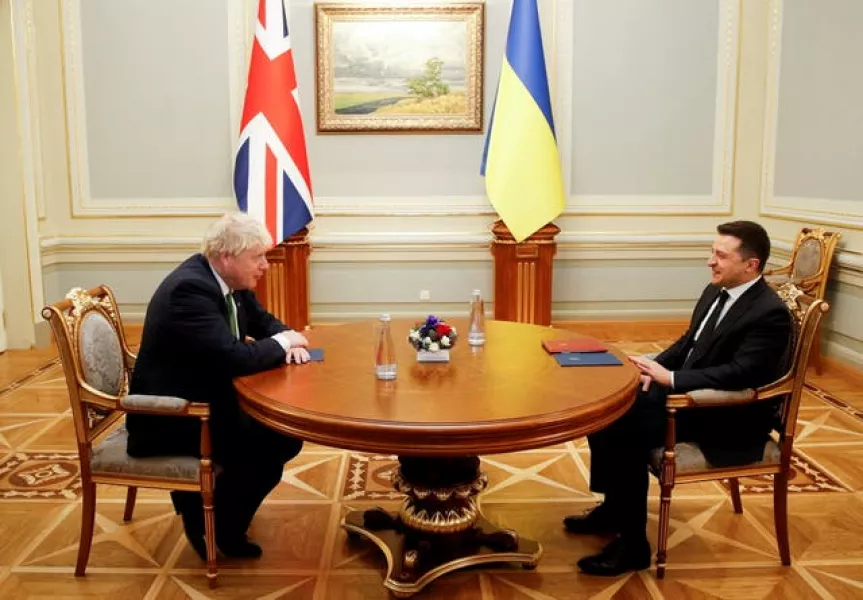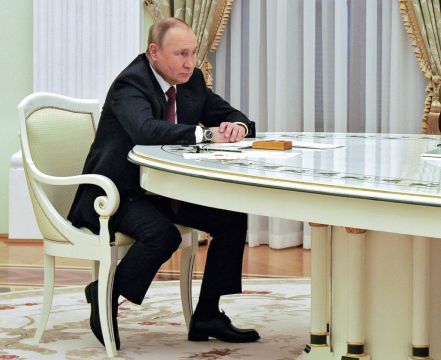Russian President Vladimir Putin has discussed tensions over Ukraine with his visiting Hungarian counterpart, a day after Russian and US diplomats exchanged sharp accusations at the UN Security Council.
The Kremlin is seeking legally binding guarantees from the US and Nato that Ukraine will never join the bloc, deployment of Nato weapons near Russian borders will be halted and the alliance’s forces will be rolled back from Eastern Europe.
The demands, rejected by Nato and the US as non-starters, come amid fears that Russia might invade Ukraine, fuelled by the build-up of about 100,000 Russian troops near Ukraine’s borders. Talks between Russia and the West have so far failed to yield any progress.

All eyes were on Mr Putin as he hosted Prime Minister Victor Orban in the Kremlin, telling the Hungarian leader he would brief him about the talks with the West on Russia’s security demands.
Mr Orban, who has forged close ties with Putin, putting Nato member Hungary in a unique position, stressed that no European leader wants a war in the region.
Mr Putin has not spoken about the issue since late December.
Washington has provided Moscow with a written response to Russia’s demands, and on Monday three Biden administration officials said the Russian government sent a written response to the US proposals.
A State Department official declined to offer details, saying it “would be unproductive to negotiate in public” and that Washington would leave it up to Russia to discuss the counterproposal.
But deputy foreign minister Alexander Grushko on Tuesday told Russia’s state RIA Novosti news agency that this was “not true.”

Kremlin spokesman Dmitry Peskov told reporters there had been “confusion” and Russia’s response to the US proposals is still in the works and will be formulated by Mr Putin.
RIA Novosty cited an unnamed senior diplomat in the Russian Foreign Ministry as saying that foreign minister Sergey Lavrov sent letters to his Western colleagues, including US secretary of state Antony Blinken, about “the principle of indivisibility of security” contained in an international document signed by all members of the Organisation for Security and Co-operation in Europe.
Russia has argued that Nato’s expansion eastward has hurt Russia’s security, violating the principle that the security of one nation should not be strengthened at the expense of others.
In a phone call Tuesday with Mr Lavrov, Blinken emphasised “the US willingness, bilaterally and together with Allies and partners, to continue a substantive exchange with Russia on mutual security concerns.”
State Department spokesman Ned Price said Mr Blinken also “further reiterated the US commitment to Ukraine’s sovereignty and territorial integrity, as well as the right of all countries to determine their own foreign policy and alliances.”
Mr Blinken also “urged immediate Russian de-escalation and the withdrawal of troops and equipment from Ukraine’s borders,” Price said.

He reaffirmed that “further invasion of Ukraine would be met with swift and severe consequences and urged Russia to pursue a diplomatic path.”
On Monday, Russia accused the West of “whipping up tensions” over Ukraine and said the US had brought “pure Nazis” to power in Kyiv as the UN Security Council held a stormy debate on Moscow’s troop build-up near its southern neighbour.
US ambassador Linda Thomas-Greenfield said in response Russia’s growing military force along Ukraine’s borders was “the largest mobilisation” in Europe in decades, adding that there has been a spike in cyber attacks and Russian disinformation.
The harsh exchanges in the Security Council came after Moscow lost an attempt to block the meeting and reflected the gulf between the two nuclear powers.
It was the first open session where all protagonists in the Ukraine crisis spoke publicly, even though the UN’s most powerful body took no action.
Meanwhile, high-level diplomacy continued on Tuesday, with British Prime Minister Boris Johnson arriving in Kyiv for scheduled talks with Ukrainian President Volodymyr Zelenskyy.

Polish Prime Minister Mateusz Morawiecki visited Kyiv in a show of support, promising to deliver more weapons to Ukraine including portable air defence systems, drones, mortars and ammunition.
He noted that Russia’s neighbours feel like they are living “next to a volcano.”
Mr Morawiecki criticised Germany for considering the certification of the newly-built Nord Stream 2 gas pipeline that would carry Russian natural gas to German consumers bypassing transit countries Ukraine and Poland.
“You can’t express solidarity with Ukraine while also working to certify the Nord Stream 2,” the Polish leader said. “By allowing the pipeline’s launch, Berlin would hand Putin a gun he could then use to blackmail the entire of Europe.”
Mr Zelenskyy said Ukraine would forge a new trilateral political alliance with Britain and Poland, hailing it as a reflection of strong international support for Ukraine.
The Ukrainian president signed a decree on Tuesday expanding the country’s army by 100,000 troops, bringing the total number to 350,000 in the next three years, and raising army wages.
Mr Zelenskyy, who in recent days has sought to calm the nation, said he signed “this decree not because of a war.”
He added: “This decree is so that there is peace soon and further down the line.”
The decree ends conscription starting from January 1 2024, and outlines plans to hire 100,000 troops over the next three years.







